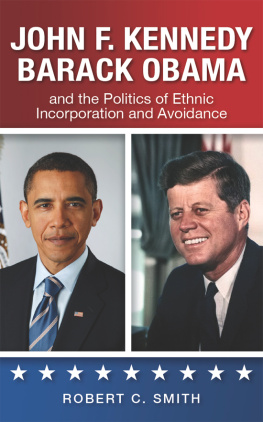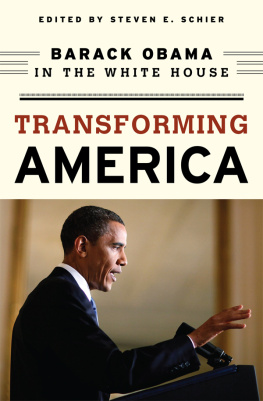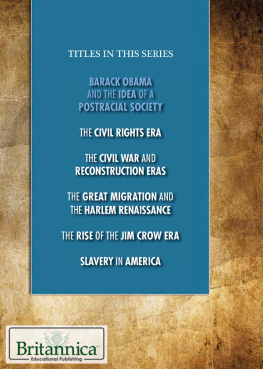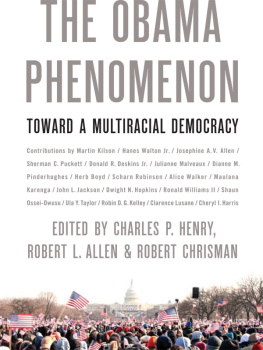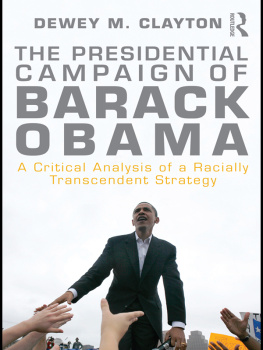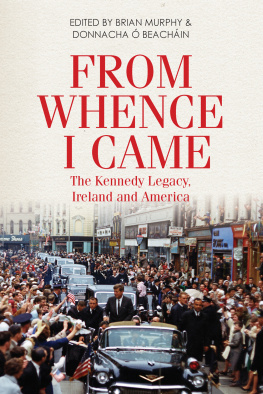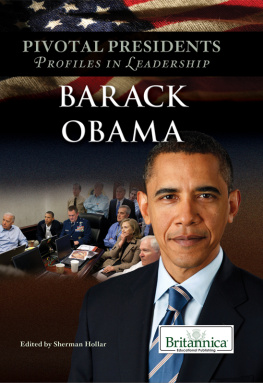SUNY series in African American Studies
John R. Howard and Robert C. Smith, editors
John F. Kennedy, Barack Obama, and the Politics of Ethnic Incorporation and Avoidance
Robert C. Smith
Published by State University of New York Press, Albany
2013 State University of New York
All rights reserved
Printed in the United States of America
No part of this book may be used or reproduced in any manner whatsoever without written permission. No part of this book may be stored in a retrieval system or transmitted in any form or by any means including electronic, electrostatic, magnetic tape, mechanical, photocopying, recording, or otherwise without the prior permission in writing of the publisher.
For information, contact State University of New York Press, Albany, NY
www.sunypress.edu
Production by Eileen Nizer
Marketing by Kate McDonnell
Library of Congress Cataloging-in-Publication Data
Smith, Robert Charles, 1947
John F. Kennedy, Barack Obama, and the politics of ethnic incorporation and avoidance / Robert C. Smith.
p. cm. (SUNY series in African American studies)
Includes bibliographical references and index.
ISBN 978-1-4384-4559-5 (hardcover : alk. paper)
1. MinoritiesPolitical activityUnited States. 2. Political participationUnited States. 3. Irish AmericansPolitics and government. 4. CatholicsPolitical activityUnited States. 5. African AmericansPolitics and government. 6. PresidentsUnited StatesElection1960. 7. PresidentsUnited StatesElection2008. 8. Kennedy, John F. (John Fitzgerald), 19171963. 9. Obama, Barack. I. Title.
E184.A1S6645 2013
323.173dc23
2012012852
10 9 8 7 6 5 4 3 2 1
In Memory of My Esteemed Mentor and Friend, Ronald W. Walters (19392010)
Tables
Acknowledgments
As with everything I have written in the last four decades, I would first like to thank my wife, Scottie, for her manifold assistance in preparation of the manuscript. Charles Henry of the University of California, Berkeley; Toni-Michelle Travis of George Mason University; and Hanes Walton Jr. of the University of Michigan read the entire manuscript and offered good suggestions for its improvement. I am especially grateful to my good buddy, collaborator, and fellow Howard University alumni Hanes for his spacious and detailed comments on the manuscript. We are coauthors of an American government textbook now in its seventh edition, and we read everything the other writes. For this manuscript he was particularly helpful in bringing to my attention obscure but illuminating sources and in urging me to develop in greater detail the concept of ethnic avoidance and its implications for democracy in America.
The anonymous reviewers SUNY Press selected encouraged me to pay more systematic attention to the relationships between race and ethnicity in minority group subordination in the United States. John Howard, the coeditor with me of SUNY's African American studies series, reviewed the manuscript with his usual discerning and critical eye, as he has done with each of the five books I have published in the series since 1992. I shall be forever grateful for his intellectual support and guidance. Michael Rinella and Andrew Kenyon, my in-house editors at SUNY Press, were critical, thoughtful, and timely from the origination of the idea for the project through the various stages of review, editing, and production. I should also like to thank Therese Myers for her very careful and discerning copy editing.
Parts of the manuscript were presented at the University of California, Berkeley, at a conference celebrating the fortieth anniversary of the publication of The Black Scholar on November 23, 2009. I also had the good opportunity to discuss the origins and research for the project in the works-in-progress section of the National Political Science Review (vol. 13, 2011). I am grateful to the editors, David Covin and Michael Mitchell, for extending the invitation.
Professor Matthew Platt of Harvard provided useful comments on , which was presented as a paper at the forty-second annual meeting of the National Conference of Black Political Scientists in Raleigh, North Carolina, March 1620, 2010.
The final draft of the manuscript was written while I was on sabbatical in the fall of 2011. The College of Behavioral and Social Sciences and the Department of Political Science at San Francisco State defrayed the cost of copying and traveling.
Finally, this book is dedicated to the memory of my esteemed mentor, friend, and colleague, Ronald Walters. Ron's death in September 2010 has left a void in my intellectual, political, and personal lives that can never be filled.
Robert C. Smith
El Sobrante, California
November 2011
Introduction
Barack Obama's election to the presidency represents the ultimate manifestation of the incorporation or integration of African Americans into the political system. This process of incorporation started in the late 1960s with the election of blacks to big-city mayoralties and appointments to high-level positions in the federal executive and judicial branches.
Obama's election represents only the second time in history that an ethnic Americana nonwhite Anglo-Saxon Protestanthas been elected president. When John F. Kennedy was elected, the Irish Catholic community had been fully integrated into American society. As Greeley writes, The Irish were probably on the verge of making it when the Great Depression rolled the Nation into a decade of economic stagnation. It took the prosperity of World War II and the postwar economic boom, plus the G.I. Bill to enable the Irish to make it definitively into the ranks of the middle class.
Related to Irish Catholic incorporation into the economy and society, by 1960 the once vibrant Irish group consciousness and identity created by the strong tie of bearing one common wrong had withered away.
Not so with Obama's election and the African American community. As I wrote in 1996 about the process of incorporation of black leaders into the political system, Compared to the experience of other ethnic groups in the United States this situation is near unprecedented. The integration or incorporation of Irish, Jewish, Polish and Italian American leaders into the institutions of the society and polity roughly paralleled the integration of their communities as a whole. In contrast, black leaders are integrated, but their core community is segregated, impoverished and increasingly in the postcivil rights era marginalized, denigrated and criminalized. As a result, unlike Kennedy and the Irish, when Obama was elected the black community still had significant group-specific demands on the state for redress of wrongs.
This book compares the Kennedy and Obama elections, and the Irish Catholic and African American experiences in the United States. Obvious similarities are found between Kennedy and Obama as presidential characters or personalities, as well as between their campaigns. For example, Caroline Kennedy, the President's daughter and his brother Senator Edward Kennedy in endorsing Obama explicitly said that Obama would be a President like their father and brother.
The Irish and the African American experiences have been frequently compared.

